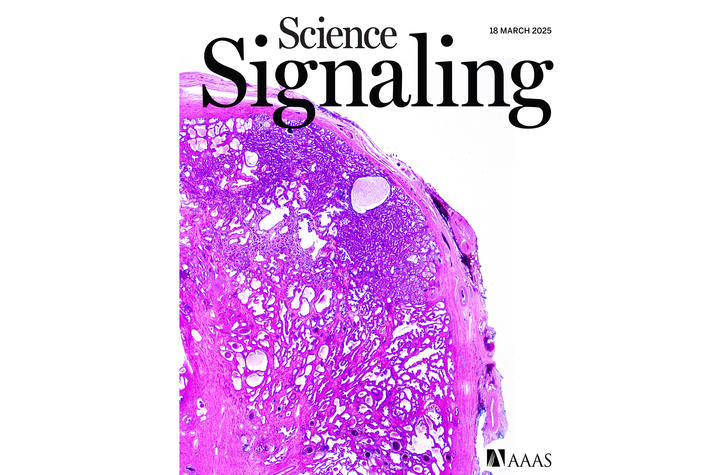UK study reveals key mechanism behind prostate cancer drug resistance, potential new treatment strategy

LEXINGTON, Ky. (April 10, 2025) — A team of University of Kentucky Markey Cancer Center researchers have found the mechanism that grants prostate cancer resistance to enzalutamide, a frequently used drug.
The article was published this month in Science Signaling, a journal from the American Association for the Advancement of Science that showcases research focused on mechanisms of cell communication and regulation.
This study was co-led by Xiaoqi Liu, Ph.D., Lucille P. Markey Endowed Chair in Oncology Research and chair of the Department of Toxicology and Cancer Biology in the UK College of Medicine, and Hsin-Sheng Yang, Ph.D., an associate professor of toxicology and cancer biology.
Prostate cancer patients that don’t respond to usual hormonal treatments are given enzalutamide, which is an androgen receptor inhibitor, also known as an antiandrogen. These medications block androgens (male hormones) from binding to their receptors, which disrupts their normal behavior and can slow down prostate cancer progression.
“Resistance to enzalutamide develops in most patients within a short treatment window, highlighting the urgent need to understand the underlying mechanisms of resistance and explore additional approaches to overcome enzalutamide resistance in prostate cancer,” said Liu.
Under normal conditions, PDCD4 is a protein that acts as a tumor suppressor. In this study, researchers found that the molecule PLK1 promotes the degradation of PDCD4 causing the activation of a pathway that clears some drugs and promotes proliferation.
“These results suggest that PLK1-induced PDCD4 degradation enhances enzalutamide resistance in advanced prostate cancer,” said Yang.
Finally, when the researchers blocked a key protein in the activated proliferation pathway, the sensitivity to enzalutamide was restored causing the tumors cell to die. Importantly, this effect was maintained when the block was performed genetically and pharmacologically, suggesting an approach to develop novel treatments.
“This study should be considered as a strategy to overcome enzalutamide resistance in prostate cancer,” said Liu.
Research reported in this publication was supported by the National Cancer Institute of the National Institutes of Health under Award Numbers P30CA177558, R01CA272483, R01CA264652 and R01CA256893. The content is solely the responsibility of the authors and does not necessarily represent the official views of the National Institutes of Health.
UK HealthCare is the hospitals and clinics of the University of Kentucky. But it is so much more. It is more than 10,000 dedicated health care professionals committed to providing advanced subspecialty care for the most critically injured and ill patients from the Commonwealth and beyond. It also is the home of the state’s only National Cancer Institute (NCI)-designated Comprehensive Cancer Center, a Level IV Neonatal Intensive Care Unit that cares for the tiniest and sickest newborns and the region’s only Level 1 trauma center.
As an academic research institution, we are continuously pursuing the next generation of cures, treatments, protocols and policies. Our discoveries have the potential to change what’s medically possible within our lifetimes. Our educators and thought leaders are transforming the health care landscape as our six health professions colleges teach the next generation of doctors, nurses, pharmacists and other health care professionals, spreading the highest standards of care. UK HealthCare is the power of advanced medicine committed to creating a healthier Kentucky, now and for generations to come.




